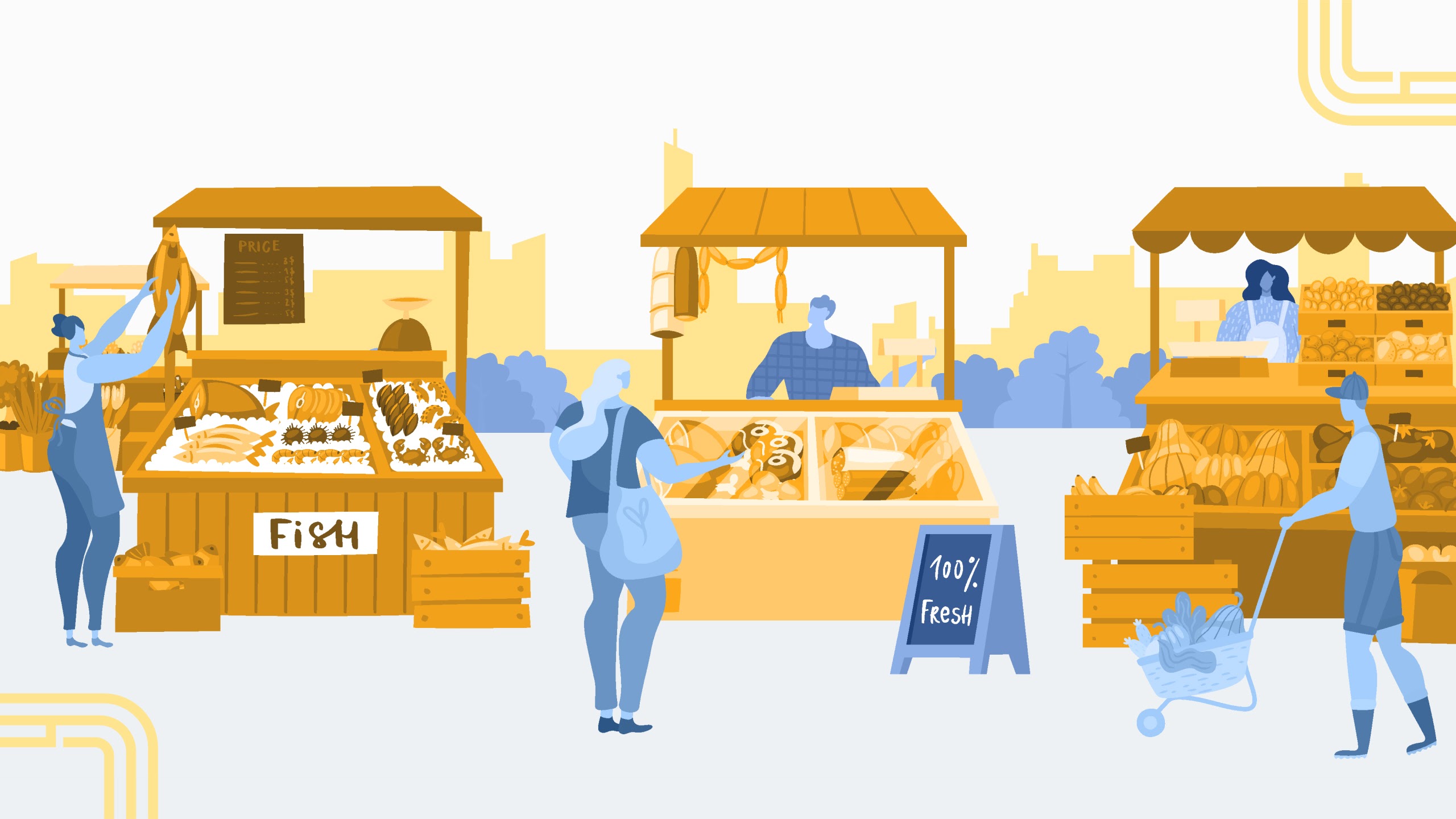Generating revenue—and value—in a post-ECQ environment

The “new normal” will compel entrepreneurs to consider local supply chains and a more sustainable way of doing business. —Artwork by Gian Bautista of UNAWA
Entrepreneurs these days ask: How can my business stay afloat amid the coronavirus disease (COVID-19) crisis? Can we still generate revenue even during the enhanced community quarantine (ECQ)? What will the “new normal” look like—and how do I prepare my business for it?
We confronted these issues head-on in UNAWA when we organized our recent webinar called, “Navigating the New Normal: Revenue Generating Trends.” As a startup ourselves, we knew the value of reaching out to experts and tapping on their wisdom to discuss the global drivers of business trends for a post-COVID world. We identify here some of the insights from top names in marketing, the food and fashion industries, and social enterprises on how local businesses can get ready for the “new normal.”
1. Pivot to give consumers what they need—aligned with your company’s purpose. “Pivot” is the word of the season, as businesses learn to shift business models to adapt to changing consumer behaviors, and find ways to stay relevant amid the lockdown. Bong Pacia, country head (Indonesia) for Mintel and a former top advertising executive in Manila and Jakarta, spoke of how industries now need to “reframe products and services, showing how they can fit into the homebound life.” This is most evident among restaurants and food industry businesses, which have quickly shifted gears to now offer more home delivery options.
The challenge, as “Resto Coach” Rommel Ng put it, is to “let your purpose drive your pivot.” He explained, “We started thinking about our purpose given the current situation. What is our ‘Why’? When you start to think of your stakeholders, all your next steps—researching, collaborating, creating, testing—will have all the stakeholders in mind.”
2. Deliver value in creative ways. Even the local fashion industry quickly pivoted to begin manufacturing masks and personal protective equipment (PPE) in order to meet the surge in demand and make use of their existing inventory and otherwise idle personnel. For Anya Lim, cofounder and managing director of the social enterprise ANTHILL Fabric Gallery, creativity begets revenue-generating opportunities for the fashion industry. “Postquarantine, people will want to wear masks that match their outfit, or masks that suit certain occasions,” she said, citing an Instagram post showing a mask matching a bikini. Lim also noted that gloves could also be a fashion staple, “especially as people become more particular about cleanliness and safety.”
Another example is the Bayanihan Bucket, a self-care kit assembled by ANTHILL in collaboration with local tea brand Tsaa Laya, essential oil brand Luna Maia, and hand lettering artist Abbey Sy. The product bundling is not just a successful creative collaboration for the sellers but an avenue to provide rice to displaced workers in urban communities in Cebu, with 20 percent of the sales going to The Rice Movement.
3. Collaborate with your sector. Collaboration also proves to be the gateway to new solutions in the “hypercompetitive” food industry, according to Ng. “There’s been a radical shift—not only in the behavior of the consumers, but also the operators … Conversational commerce has been on the rise, and even on the aggregators’ side—on the last end of completing the cycle, the delivery companies—there have been emerging players challenging the established ones … and people are starting to collaborate and form communities, to think of better solutions, to serve the customers better. [They are] coming up with solutions that are more collaborative and sustainable [for the long term].”
4. Go local. As the global supply chain suffers from disruptions, local suppliers are sought to ensure the sustainability of their production and supply. Pacia noted that “the local movement [applies to] more than just food—it’s a seismic shift in why, where and how we consume.”
Reese Fernandez-Ruiz, president of social enterprise Rags2Riches and UNAWA’s hief finance officer, agrees. “A lot of people are going to look for local sources that are readily available because it feels as if the boundaries between countries are higher right now. Something can just happen, and immediately your supply chain crumbles … We’ve seen that there are now many new clients who’ve reached out to us because they couldn’t get their regular supply from abroad.”
Fernandez-Ruiz noted, however, that companies cannot take customer service for granted. “While the companies that are seeking you out are [for now] desperate for supplies, what would keep them for the long term is good service and good relationships.”
5. Be driven by your values. Beyond the obvious paradigm shift occurring under current circumstances, another emerging change appears to be a consciousness shift toward values-based consumption. Consumers are increasingly becoming more careful about where they spend their hard-earned money and scarce resources. Beyond being fashionable or trendy, it now makes more sense to buy and consume what is endemic—from renewable and indigenous energy, to food and fashion.
“Now people value the slow life that we’re living in—they are more reflective and intentional about spending money, that’s why transparency and communication work,” Lim shared. “I feel that companies would also want to produce products … that really benefit not just the consumer but those who made those products.”
Fernandez-Ruiz added, “I’m also hopeful that the new status symbol will not be how much you have but how much you care, because that’s what’s going to matter in this time.”
While these unprecedented times call for unprecedented measures, we are all presented with an opportunity to redefine this new normal. By integrating values more closely into business operations and decision-making, we can look forward to a new normal economy that is more sustainable and inclusive. —CONTRIBUTED INQ(The author is CEO of UNAWA, a rising regulatory tech startup that aims to accelerate ease of doing business so MSMEs can start, grow, and scale their businesses in the digital economy.)
